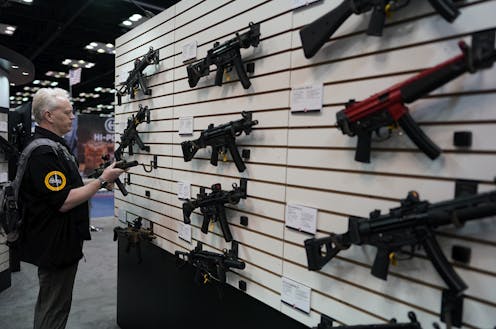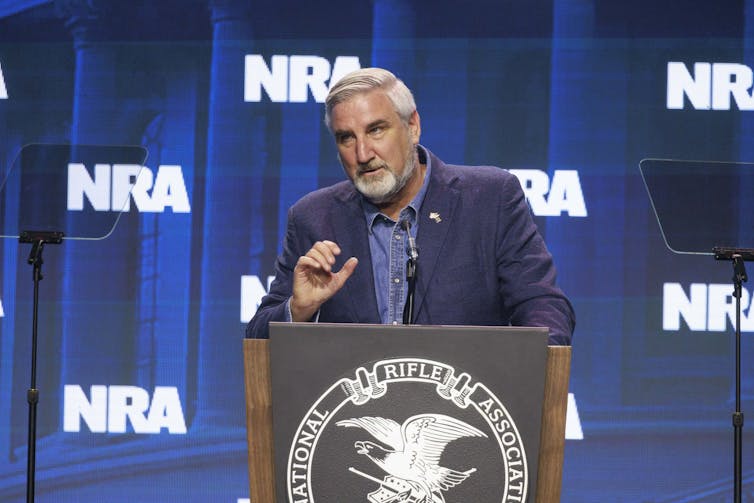Gary, Indiana’s lawsuit against gunmakers is shot down by a new law, after surviving 25 years of app
Expect other states to pick up the civil-litigation torch.

After 25 years of legal wrangling, a lawsuit described as “the most consequential legal case against the gun industry in this country” appears to have met its end – but the industry isn’t out of the legal woods just yet.
Back in 1999, the city of Gary, Indiana, filed a lawsuit attempting to hold firearm manufacturers responsible for failing to prevent illegal gun sales. On March 15, 2024, Indiana Gov. Eric Holcomb signed a law aimed at extinguishing the suit.
As a legal scholar who has followed the case since it was first filed, I believe that the now all-but-certain dismissal of this lawsuit represents a major setback for gun control advocates.
But it won’t stop other states from trying to use civil litigation to rein in the gun industry. To understand why, let’s take a closer look at how Gary’s lawsuit lasted so long in the Indiana courts, and how state lawmakers finally gunned it down.
Blaming gunmakers for illegal retail sales
In September 1999, Gary sued 11 leading handgun manufacturers, including Smith & Wesson, Beretta, Glock and Ruger. The suit alleged that a small group of gun stores was responsible for a large amount of illegal gun sales in the state.
Through a sting operation, the Gary Police Department discovered that certain retailers conducted straw sales, failed to perform required background checks and intentionally sold guns directly to ineligible buyers.
The lawsuit further claimed that the gun manufacturers “intentionally ignored” these illegal practices to boost their profits, and so served as “knowing accomplices.”
Gary’s lawsuit demanded that the gunmakers compensate the city for the costs of emergency services, policing, lost tax revenues and lower property values caused by gun violence. Gary also asked the court to issue an order requiring the manufacturers to take reasonable measures to reduce the risk of illegal sales — for example, by cutting off the supply of weapons to gun stores with a record of illegal sales.
In 2001, a state trial court dismissed Gary’s lawsuit, but the city successfully appealed to the Indiana Supreme Court, which, in 2003, sent the case back to the lower court for trial.
The gun industry’s federal immunity shield
In 2005, Congress passed the Protection of Lawful Commerce in Arms Act, or PLCAA, which prohibits lawsuits against firearm manufacturers and sellers for injuries arising out of criminal misuse of a gun. Armed with this new federal immunity shield, the gunmakers in the Gary lawsuit moved to dismiss the case a second time.
However, both the trial court and an appellate court refused to dismiss the case. The appellate court explained in a 2007 opinion that the federal immunity shield didn’t apply to Gary’s case.
Although sweeping, PLCAA immunity doesn’t protect a manufacturer or seller who “knowingly violated a state or federal statute applicable to the sale or marketing” of a firearm. The court reasoned that because the gunmakers had served as knowing accomplices to the violation of state and federal laws governing the sale of firearms, PLCAA immunity didn’t protect them.
The Indiana Supreme Court refused the gunmakers’ resquest to appeal the decision, and the case went back down to the trial court again.

Indiana’s state immunity shield
In 2001, four years before Congress passed PLCAA, Indiana passed its own state law granting firearm manufacturers and sellers immunity from civil lawsuits arising out of criminal misuse of weapons. In 2015, Indiana’s then-governor, Mike Pence, signed a law making the state’s immunity law retroactive to Aug. 26, 1999, four days before the city of Gary initially filed its lawsuit.
For a third time, the gunmakers moved to dismiss the lawsuit, and once again, the courts refused.
A 2019 appellate court opinion explained that the specific language of the state’s immunity statute did not cover the gunmakers’ alleged “willful blindness” to illegal retail sales of their weapons, making them accomplices to illegal activity.
The appellate court sent the case back to the trial court.
The final blow
In June 2023, the trial court allowed discovery in the case to go forward. During discovery, opposing parties in a lawsuit share information that may be later used as evidence in a trial. Amid wrangling over discovery requests, lawyers for Gary hoped to force the gunmakers to turn over any internal documents that would show if they knew about illegal activity among retailers who sell their products.
However, with the new law signed by the current governor, Holcomb, the discovery process has been preempted, and the case is all but certain to be dismissed — this time, for good.
The dismissal of Gary’s lawsuit means that gun control advocates have lost the most promising means of finding a smoking gun that they have long hoped would prove that gun manufacturers knowingly facilitate illegal sales.
In its defense, the gun industry has denounced lawsuits attempting to hold it responsible for firearm-related violence as frivolous fishing expeditions.
The National Shooting Sports Foundation — the industry’s leading trade association — insists that industry defendants have readily complied with discovery requests in the Gary case to turn over sales records and to depose industry executives.
The group has also argued that holding gun manufacturers liable for the misuse of their products would be as absurd as holding car and beer companies liable for drunk driving.
In my view, the industry’s intensive lobbying efforts in the state legislature to quash the lawsuit suggest it isn’t confident that it would ultimately prevail in court. The recent success of lawsuits against opioid manufacturers for enabling misuse of their products gives gunmakers good reason to seek legislative protection from lawsuits.
What’s next?
Not all state legislatures have been as eager as Indiana’s to shield the firearms industry from civil lawsuits. A growing number of states — including New York, California, Illinois, New Jersey, Delaware, Colorado, Washington and Hawaii — have recently passed laws that make gunmakers liable for selling weapons without implementing “reasonable controls” to prevent illegal sales by retailers.
In these states, legislatures appear to be fanning the flames of civil litigation against the gun industry instead of trying to extinguish it.
What this means for the industry remains to be seen.
Timothy D. Lytton has provided expert consulting services to law firms representing gun violence victims.
Read These Next
Why US third parties perform best in the Northeast
Many Americans are unhappy with the two major parties but seldom support alternatives. New England is…
Pittsburgh nurses are fighting for better staffing ratios — and the research backs them up
As nurses in Pittsburgh and nationwide spotlight staffing shortages, better pay and workplace safety,…
Why ICE’s body camera policies make the videos unlikely to improve accountability and transparency
For body cameras to function as transparency tools, wrongdoing would have to be consistently penalized,…






